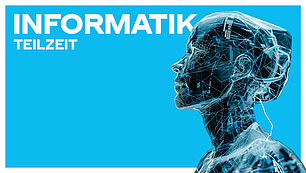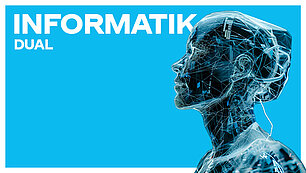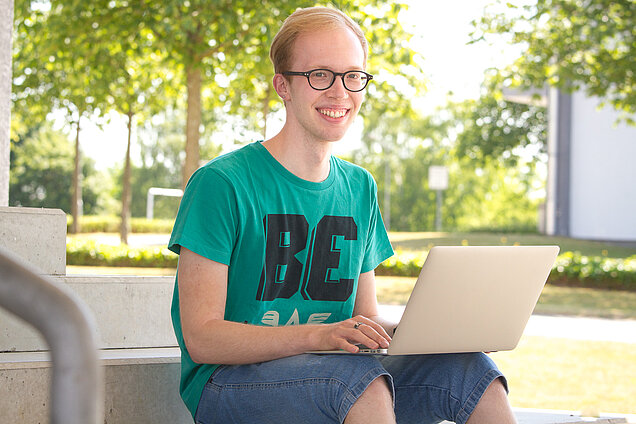

The master class in computer science!
Our Master's degree programs in Computer Science
Putting computer science into practice with a flexible range of degree programs
Have you successfully completed a Bachelor's degree in Computer Science? Do you want even more - to deepen and expand your knowledge, to push the boundaries of computer science? Let us be your companions on your way to a Master of Science degree!
Profile lines
Do you want to focus on a specific subject and get to know and develop state-of-the-art computer science? We offer you two main areas in which you can work with us on current issues in computer science:
- Study focus on Machine Learning and Software Engineering
- Study focus Human-Computer-Interaction
Study Models
Depending on your needs, you can choose our Computer Science Master's program as a
- Computer Science Dual study model
- full-time study program (german),
- part-time study program (german) or
- in a dual study model (german) with a company.
You can switch between the study program models within a reasonable framework in order to adapt your studies to your life circumstances.
Language
The languages of instruction are German and English. In the German-language study program models, we also require a good knowledge of English so that you can also follow courses taught in English. In the English-language study program models, we require a moderate knowledge of German at the beginning of your studies, which you can improve during your stay in Germany so that you can also follow German-language lectures in the higher semesters.
At a glance
Degree
Master of Science
Study Type
Graduate Studies, Präsenzstudium
Study Model
Full time studies
Campus
Zweibrücken
Faculty
Computer Sciences and Microsystems Technology
Normal period
3 Semester
Requirements
Completed Bachelor's degree in Computer Science with 210 ECTS (180 ECTS with conditions possible). Details are regulated in the examination regulations.
Language skills in German at least B2 level and in English at least B1 level.
Pre Placement
No
Start Informations
Summer and Winter Term Program can be started in winter and in summer term!
Teaching Language
Accreditation
Internal accreditation
Why study computer science at Kaiserslautern University of Applied Sciences:
The application areas of computer science are diverse and the career prospects are very good. With specialization courses and project work, you can focus on an area of application that deepens your previous knowledge or complements it with additional skills. The specialization subjects play a dual role: they provide a solid foundation in important and economically relevant topics and are also an area of application for acquiring methodological skills.
Machine Learning and Software Engineering profile line
How do we develop complex software systems? How do we deal with the human factor in an IT project? How will artificial intelligence techniques change future software systems and how will they change software development itself?
We enable you to apply and implement best practices in all phases of a software project, from requirements analysis and software architecture to testing and continuous deployment, and adapt them to the specific constraints. You will learn about artificial intelligence techniques so that you can apply them in your software projects and use them during implementation.
Human-Computer-Interaction profile line
How will we deal with applications in the near future? Why are smartphone apps so often unusable? What possibilities for interaction between humans and technology will there be in the future? Based on the theoretical principles of interaction design, we will enable you to design and implement interfaces between humans and technology and test their suitability for everyday use. Mobile applications, desktop applications, mixed reality, tactile interfaces - we set no limits to your curiosity and creativity!
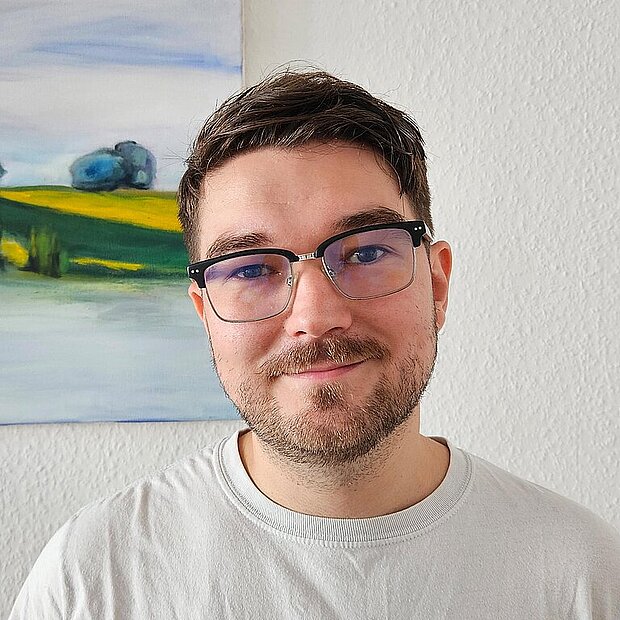
"At Kaiserslautern University of Applied Sciences, you learn to work together on solutions through many practical projects. Due to the comparatively small size of the lectures, you are not just a number to the professors and many individual questions are addressed in the seminars. " (Photo: private)
Graduate, Fabian Kalweit
General information
The degree program
In the first two semesters, challenging courses will deepen and broaden your specialist knowledge.
In addition to the compulsory subjects and the profile subjects of your chosen specialization, you will also take compulsory electives. On the one hand, you will take electives that are specific to your specialization and, on the other, overarching modules that delve deeper into current topics in computer science.
An important module in the winter semester is the scientific project (depending on the Human-Technology Interaction or ML and Software Engineering profile): we work with you on a current topic in computer science. This can be a large open-source project or you can further develop complex software in a company. The scientific question should come from your area of specialization and will help to push the boundaries of computer science a few steps further.
You can plan this project very freely, and you can also earn ECTS points during lecture-free periods. This allows you to adapt the course of study to your personal situation. A prerequisite for registering for the project is that you have already earned 15 ECTS credits in your Master's degree.
We want you to be able to think outside the box of your profile line. You choose a range of cross-profile modules - we offer topics from databases, data security, big data and artificial intelligence methods to the implementation of mobile or mixed-reality applications - there are (almost) no limits to your curiosity!
The course culminates in the Master's thesis in the final semester of the course.
You can start your studies in the summer or winter semester. The modules are designed in such a way that this is very feasible. Here we show you what your studies could look like if you want to start in the summer or winter semester:
Start of studies in the summer semester (the regular case)
In addition to a compulsory subject and a further compulsory profile subject corresponding to your chosen profile line (both with 6 ECTS credits), you will take a compulsory profile elective subject and two cross-profile compulsory electives worth a total of 18 ECTS credits. This results in 30 ECTS credits in your first semester.
Towards the end of your first semester, you decide when you want to start your project work. This is possible at any time from August onwards. This means that you can decide for yourself when to submit your project work (9 ECTS) after the 16 weeks stipulated in the examination regulations.
In the winter semester, you will then take the second compulsory subject, another compulsory profile subject and a cross-profile compulsory elective module (all worth 6 ECTS credits) and the Social Skills course (3 ECTS credits) that is part of your project. On the surface, this looks like only 21 ECTS, but you must take into account that, depending on your planning, at least 8 weeks of your project work will extend into the winter semester. This means that these 9 ECTS count in the winter semester, resulting in another 30 ECTS.
After the winter semester, nothing stands in the way of you starting your Master's thesis in the following summer semester.
Start of studies in the winter semester
You will take one compulsory subject and one compulsory profile subject as well as one compulsory profile elective and two compulsory cross-profile electives (each worth 6 ECTS credits). You will also take the subject Social Skills (3 ECTS), which is part of your project, before carrying out your project. That makes 33 ECTS. This extra work is worthwhile as it gives you some free time in the following summer semester. The semester break between the winter and summer semesters is somewhat shorter than in the summer, so you only have around 6 weeks available for the project rather than around 8 weeks during the lecture-free period. Towards the end of your first semester, you decide when you want to start your project work. This is possible at any time from February onwards. You decide when to submit your project work after the 16 weeks stipulated in the examination regulations.
In the summer semester, you will then take the second compulsory subject, a second compulsory profile subject and a further compulsory profile elective subject, making 18 ECTS credits. In addition, you will complete your project with 9 ECTS credits. This makes a total of 27 ECTS credits and here you use the leeway you gained in the winter semester.
Then nothing stands in the way of you starting your Master's thesis in the following winter semester.
Admission to the Master's degree programme is open to students who have a first professionally qualifying degree with a good final grade in a Computer Science degree programme. Further details can be found in the examination regulations.
If you have obtained your Bachelor's degree in 6 semesters, i.e. you only start with 180 ECTS credits, you must complete a further 30 ECTS credits through a selection of cross-profile compulsory electives in the Master's programme. You will then study for 4 semesters. Alternatively, you could also aim for a reduced Master's degree with 270 ECTS credits, although this will not qualify you for a higher career in the civil service.
If your Bachelor's degree has 210 ECTS credits, your standard period of study is 3 semesters, as specified in the study plan.
Complex software projects are a challenge. Technical aspects challenge us. No project without the human factor - customers and users are at the forefront. We prepare you for the next challenges. You will learn how to integrate data science and machine learning into products in a meaningful way and how you can use them to increase your productivity in your professional life.
In the Machine Learning and Software Engineering profile line, in addition to the basic subjects of Automata, Computability and Complexity and Advanced Software Engineering, you will take the following subjects
- Project Software Development,
- Social Skills,
- Machine Learning and
- Data Science
In the software development project, you will work in a team on a complex software engineering topic.
Depending on your profile, you will take at least two of the profile electives:
- Deep Learning,
- IT management,
- Secure Software Engineering,
- Advanced Robotics,
- AI-supported image analysis,
- software quality management.
How will we interact with technology in the future? Will we control the technology, or will the technology control us? We need to be able to design and implement outstanding interfaces.
In the Human Computer Interaction profile line, in addition to the basic subjects of Automata, Computability and Complexity and Advanced Software Engineering, you will take the following subjects
- Project Human-Technology Interaction,
- Social Skills,
- Framework-based UI development and
- interaction design.
In the Human-Technology Interaction project, you will work in a team on a complex task relating to user interfaces.
Depending on your profile, you will take at least two of the profile electives:
- Advanced Interactive Systems,
- Market and advertising psychology,
- Automotive User Interfaces,
- Methodology of empirical research.
We want you to think outside the box! That's why you can choose from a wide range of compulsory elective modules. You can also choose from the subjects of the neighboring profile line. You choose at least three of the following courses:
- Computer Vision
- Implementation and optimization of database systems
- Programming techniques for embedded systems
- Mobile communication
- Advanced topics in computer graphics
- Quantum computing and quantum information
- Business Process Technologies
- Compiler construction and programming languages
- Current topics from research and practice
Computer science is international! You can replace your three cross-profile compulsory electives with a mobility module and study at a foreign university. To do this, you draw up a learning agreement with us, study abroad and then we recognize the work you have done there.
Have you gained professional experience after your Bachelor's degree? Or are you already deepening the skills you acquired with us in professional practice? We think that's excellent! You can contribute these skills in the mentor-accompanied practical activity module and thus replace two of the cross-profile compulsory electives!
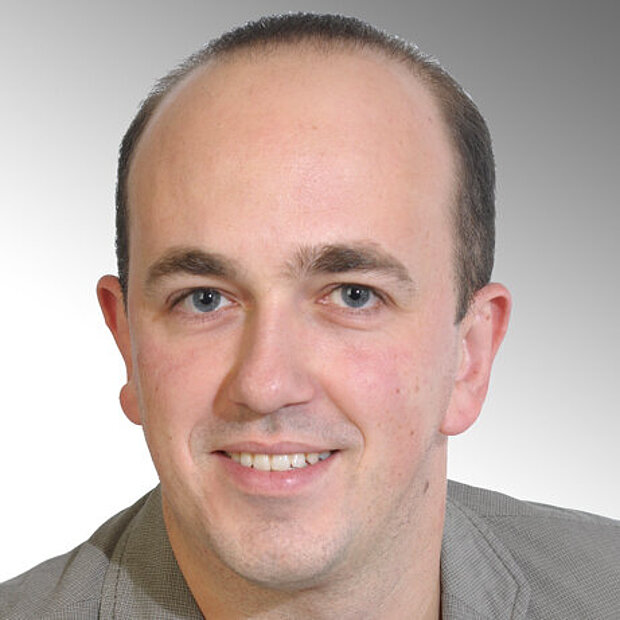
"The Master's degree program in Computer Science offered me the opportunity to design my further studies according to my interests due to its many elective subjects. In my later day-to-day work as a software engineer, I was able to use a lot of what I had learned to solve the challenges I faced. " (Photo: private)
Graduate, Mathias Fedder

